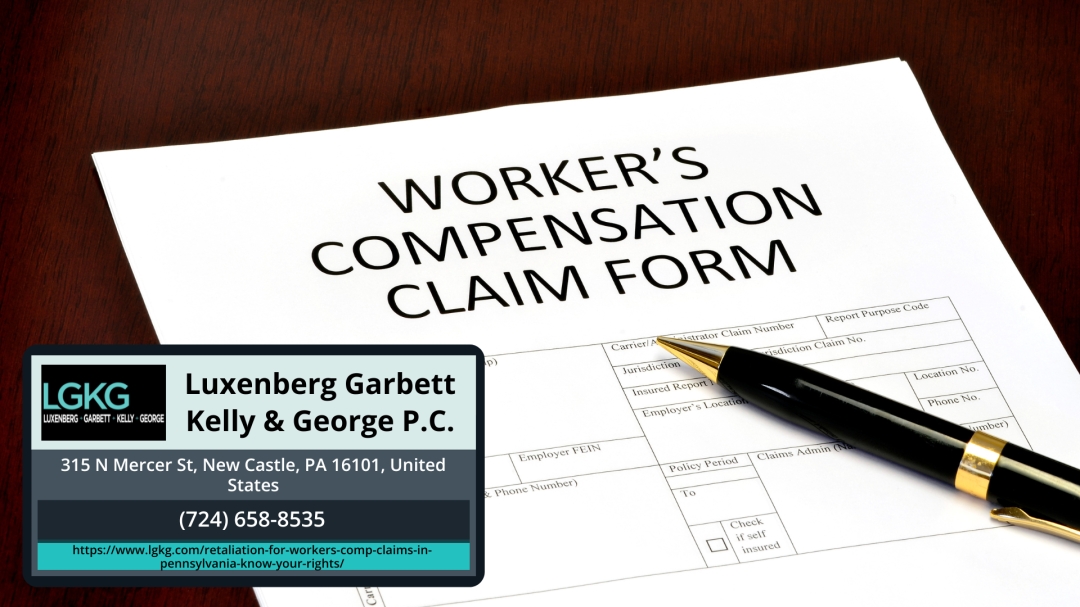Retaliation against injured workers who file for benefits remains a persistent and unlawful problem in Pennsylvania workplaces. The Western Pennsylvania workers’ compensation attorneys at Luxenberg Garbett Kelly & George P.C. (https://www.lgkg.com/retaliation-for-workers-comp-claims-in-pennsylvania-know-your-rights/) are calling attention to this critical issue and encouraging injured employees to understand and assert their legal rights when faced with wrongful treatment.
For many injured workers, seeking compensation is not just a financial necessity—it’s a legally protected right. However, some employers respond with demotion, job reassignment, or even termination, sparking concern and confusion among employees already struggling with injury. The Western Pennsylvania workers’ compensation attorneys at Luxenberg Garbett Kelly & George P.C. are committed to helping workers understand that the law is on their side, and retaliation for filing a claim is prohibited.
Pennsylvania law provides clear protections for employees who report job-related injuries or file workers’ compensation claims. The Western Pennsylvania workers’ compensation attorneys at Luxenberg Garbett Kelly & George P.C. emphasize that retaliation—whether blatant or subtle—violates public policy and specific state statutes. “The Pennsylvania Supreme Court has made it clear that the Workers' Compensation Act reflects a strong and unmistakable public policy: protecting injured workers and providing them with a path to compensation and medical care,” the firm notes in its recent guidance.
At-will employment, which allows employers to terminate staff without warning, does not override these rights. In Pennsylvania, this legal framework is counterbalanced by the public policy exception. This means that while employers can make decisions about staffing, they cannot fire someone simply for asserting their legal rights, such as filing for workers’ compensation after a workplace injury. Courts look at the timing and context of a firing to determine whether it was retaliatory.
Luxenberg Garbett Kelly & George P.C. explains that Pennsylvania’s anti-retaliation statute—Title 43 P.S. § 933.10—gives injured workers powerful tools to defend their rights. The statute prohibits employers from discriminating or taking adverse action against employees for exercising their legal rights under the Workers' Compensation Act. This includes filing a claim, making a complaint about noncompliance, or simply informing coworkers about their rights. The statute even protects workers who raise concerns in good faith, even if those concerns are later found unsubstantiated.
“Retaliation after filing a workers’ compensation claim is not always dramatic or immediate,” notes Luxenberg Garbett Kelly & George P.C. “In many cases, it unfolds gradually, masked as everyday management decisions or subtle changes in working conditions.” This could include reduced hours, denial of benefits, increased scrutiny, or being transferred to less desirable roles. These forms of retaliation, while harder to detect, are just as illegal.
The firm also highlights a key legal provision that supports retaliation claims: if an employer takes adverse action within 90 days of an employee filing or reporting a claim, the law presumes the action was retaliatory. This “rebuttable presumption” shifts the burden to the employer to prove a legitimate reason for the adverse action, giving workers a significant advantage in proving their case.
Another common concern is whether workers’ compensation benefits continue if an employee is fired. According to Luxenberg Garbett Kelly & George P.C, benefits should not automatically stop if the employee is already receiving them. However, employers may attempt to challenge ongoing payments by alleging misconduct or insubordination as grounds for termination. In these situations, the workers’ compensation judge evaluates whether the injury still limits the employee’s ability to work and whether the termination was justified.
The firm also clarifies the difference between a workers’ compensation claim and a retaliation lawsuit. While the former addresses the injury and related benefits, the latter is a separate legal action aimed at holding employers accountable for retaliatory conduct. Retaliation lawsuits may result in compensation for lost wages, emotional distress, and even punitive damages, depending on the severity of the employer’s actions.
For employees who have experienced job loss, demotion, or harassment after reporting a workplace injury, legal remedies may be available. Damages in a retaliation lawsuit can include back pay, front pay if reinstatement isn’t possible, compensation for emotional distress, and attorney’s fees. In serious cases, courts may also award punitive damages to deter future misconduct.
Luxenberg Garbett Kelly & George P.C. encourages any worker in Pennsylvania who suspects retaliation to document incidents, gather records, and seek legal guidance immediately. Acting quickly can help preserve evidence and ensure legal protections are upheld.
Retaliation after a workplace injury isn’t just unfair—it’s against the law. The legal team at Luxenberg Garbett Kelly & George P.C. continues to defend workers across Western Pennsylvania who are treated unfairly after filing a legitimate claim. Their approach ensures that injured employees don’t face additional harm simply for standing up for their rights.
Employees who believe they’ve been targeted after reporting a work injury are encouraged to reach out to Luxenberg Garbett Kelly & George P.C. for help navigating the legal process and protecting their rights.
About Luxenberg Garbett Kelly & George P.C.:
Luxenberg Garbett Kelly & George P.C. is a team of Western Pennsylvania workers’ compensation attorneys committed to standing up for injured workers. With a focus on workplace injury claims and related retaliation cases, the firm helps clients understand their rights and take action when those rights are violated.
Embeds:
Youtube Video: https://www.youtube.com/watch?v=mKg06r1o4Eg
GMB: https://www.google.com/maps?cid=1349618312503922919
Email and website
Email: lmkelly@lgkg.com
Website: https://www.lgkg.com/
Media Contact
Company Name: Luxenberg Garbett Kelly & George P.C.
Contact Person: Lauren Kelly Gielarowski
Email: Send Email
Phone: (724) 658-8535
Address:315 N Mercer St
City: New Castle
State: Pennsylvania 16101
Country: United States
Website: https://www.lgkg.com/

